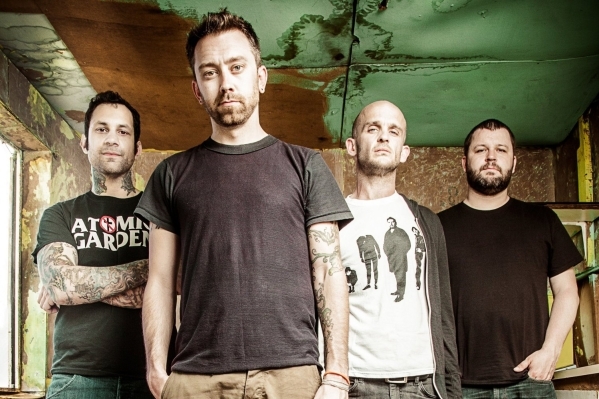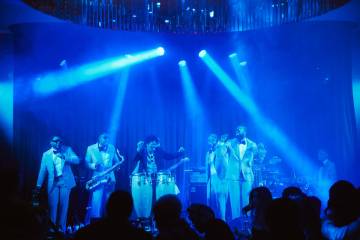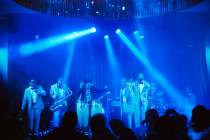Rise Against frontman remains a voice for change
Activism can get wearisome sometimes.
No one perhaps knows this better than Tim McIlrath, the outspoken frontman of Rise Against. From expressing opposition to deforestation to protesting our country's militarization, McIlrath has always made sure his band fully embodies its name.
Being an activist everyday of your life, though, eventually gets exhausting, as reflected in the title track from Rise Against's latest record, "The Black Market," which is, ironically, probably the act's least political record to date: "We traffic in the blackest of markets / Trade misery like diamonds and gold / The angst that we exchange for applause or petty praise / Is finally now taking its toll."
"It's not just activism, but the price that you extract by, sort of, you know, writing these songs that are, essentially, kind of, the by-product of cutting yourself open and putting it all out there, you know?" McIlrath says. "I guess that describes a lot of art, in general, what artists do. And so that was a song that kind of explored that, and then certainly, as a band that's political, that sort of activist burnout was something that I wanted to address, too, because it's something that we go through.
"Anybody that chooses to engage, like wholeheartedly, in pushing against a wall that doesn't seem to move — or if it does move, it moves at a glacial pace — that can be something that is exhausting, frustrating and there can be times when just feel like you want to surrender. I've met a lot of people in our fan base and a lot our friends and other bands … sometimes you don't want to push up against that wall anymore.
"Sometimes that wall tends to defeat you. I think one of the best ways to address that is to talk about it, to be honest about it and acknowledge that it exists, because I feel like there's a way … like if you acknowledge it and you understand that that's something that you're going to go through, it helps you sort of wake up the next day and say, 'But I still want to do this,' instead of burning out completely and just disappearing and saying, 'F--- it. I can't change anything. I'm just going to throw in the towel.'"
"Something that I tell a lot of our fans who are young and they get engaged and see the world not changing overnight, you know, they get frustrated, I like to tell them, like, 'Just because you can't change everything doesn't mean you shouldn't try to change something.' That's why it's still valid. Just like anything, if you're burning bright all the time, it's easy to fade away."
Being an activist, though, as McIlrath point out, isn't necessarily even about providing a solution as much as it is stimulating a discussion.
"I think when I was younger and I was writing these songs, I was definitely coming from a place where, like, I have the answers," he explains. "And now as I get older, I'm coming from a place of, like, I have the question. I feel like far more of me is more questioning than giving an answer. I feel like we can be a band that asks those hard questions that not everybody is asking — or the kind of questions that an audience wants to hear a band asking — but I don't feel confident that I have the answers, though. Rise Against takes you on that journey."
But sometimes the trip isn't as neatly mapped out as it seems. Even someone like McIlrath, a person who's absolutely resolute when it comes to his convictions, has been faced with the prospect of having to change the way he's felt about things when he it became clear that ultimately, when it comes down to it, everything is all shaped by perspective. There's nothing like some real-life experiences to underscore this notion.
"I remember when we filmed the video for 'Ready to Fall,' we filmed it in a clear-cut forest in British Columbia, north of Vancouver," McIlrath recalls. "And you're out in this clear-cut forest and you're feeling this seething anger towards all these loggers, these guys out there who are cutting trees down.
"And the next day, we went to a sawmill, and I met a bunch of really cool, working-class people in Rise Against T-shirts, talking about how their friend died in a sawmill because an activist put a metal spike in a tree that exploded their saws and sent shrapnel all through the sawmill. There was a tin roof on the sawmill, and you could see hundreds of little shards of light coming through these little holes in the tin roof. And the holes were made from shrapnel exploding inside these trees they were sawing.
"And so, you explore these issues, and you realize they're really complicated and complex. It might be easy to hate the loggers, but maybe that's misplaced hate. Really, we're just a society that demands all these resources and somebody is going to be providing them if we don't stop the demand for them. Or we're a society that votes 'yes' to go to a war that people no longer believe in, someone has to go fight that war, and usually it's people who are really just looking for money to go to college or a way out of poverty or a way out of a crappy neighborhood, or something like that."
For McIlrath, being a member of Rise Against, a band whose very moniker equates to opposition, has always meant standing up for what he believes in, even when it polarizes people — including people he loves. Imagine the weight of being the son of a military veteran and then having to discuss refusing to play on a festival stage sponsored by the Army. Or how about singing songs like "Hero of War," a poignant tune that holds up a mirror to the atrocities of war?
That tune, inspired by the story of a soldier who experienced a crisis of conscience from his wartime experience, touched a nerve and sparked outrage among some folks. But it also spoke just as much to others who could relate. And that's really what it's all about for McIlrath and his bandmates.
"That's something that I've had to come to terms with, in a rift, no matter what, I'm trusting my instincts when I'm writing the song," says McIlrath, who reveals that his band's next record, which Rise Against will begin work on next year, may end up being its most political to date. "This is how I feel. I don't want to censor myself, and above all, I want to reach somebody with this message and reach a person who maybe feels similar, so this song can help empower them and let them know that they're not alone in this feeling. And I so I have this responsibility to the ether of Rise Against fans to say it.
"Then I've got to go home for Thanksgiving and talk to my dad, who's a military vet, and he's heard the song. I have a responsibility to my art and I'm willing to put a lot on the line to do that. There's a big picture here. I can deal with my own personal relationships with people, and I can either have those conversations with people like my dad and sort of explain myself, but what I don't want to do is censor myself because it's convenient.
"What's interesting is that I'm not really a confrontational person. I don't walk around my neighborhood waving a sign. It's not a part of my every day. But being who I am, you sort of already know my deal, if you know who I am.
"The band's been a journey. And it's helped to see multiple sides of everything, and I think that, hopefully, it helps you have a better perspective on all the issues."
— Read more from Dave Herrera at reviewjournal.com. Contact him at dherrera@reviewjournal.com.
Like Neon Las Vegas on Facebook:




























